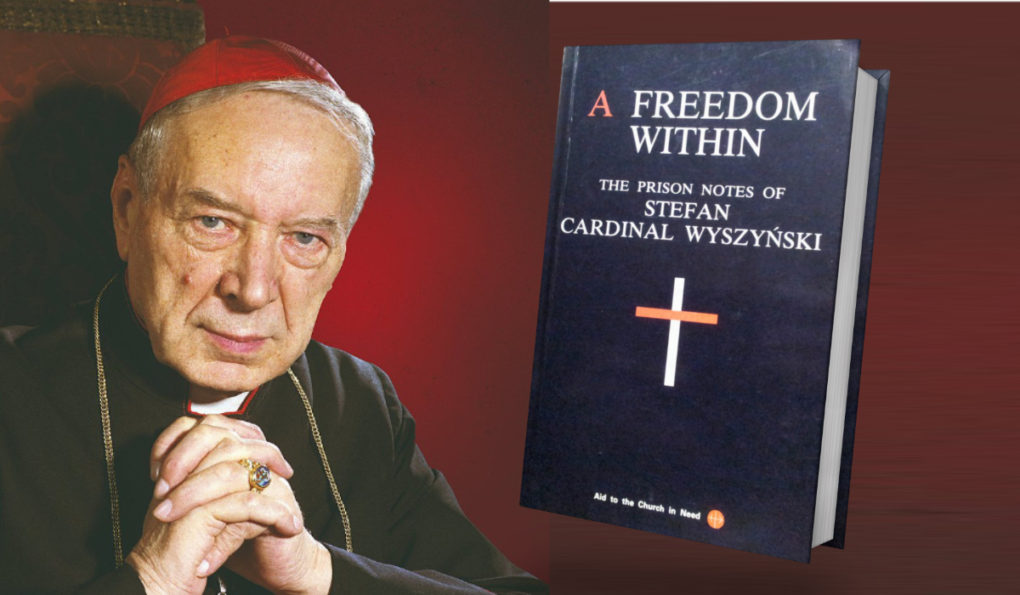A Freedom Within: The Prison Notes of Stefan Cardinal Wyszynski
Stefan Cardinal Wyszynski
Harcourt Brace Jovanobish Publisher
1983
350 pages
Recently Beatified Cardinal Wyszynski in some ways is the father of modern Poland. A symbol of resistance to Communist rule, he shares a special place in history along with his fellow historical figures in Hungary and Yugoslavia.
On the night of September 25, 1953 Cardinal Wyszynski was awakened, arrested and without indictment, trial or sentence forced into internal exile. Until his release on October 28, 1956, he was confined by armed guards in four different places. During his imprisonment he wrote his Prison Notes, which was published in 1982 shortly after his death.
Unlike Mindzenty in Hungary his punishment did not involve physical torture but the limitations of his personal freedom and concentration camp isolation are worth reading about. They show what Communism did to the world and in a particular to people who stood up to its brutality.
The title alone sends a message that there are two types of freedom. Our external freedom may be curtailed but outside forces cannot reach the freedom of the heart, the freedom to love God. These prison notes give ample testimony to the existence of that interior freedom and the consolation of an interior life when faced with unjust persecution.
The government made it clear that bishops were not welcome at the celebration for the Millenium of Poland’s birth and baptism as a nation. Permission to build churches was restricted. Supplies of paper and ink for Catholic publications were cut. Crude devices were used to discourage pilgrimages and processions. Cardinal Wyszynski told the government “After ten centuries of Catholicism, we have the right to be a Catholic nation and we do not resign that right.”
He insisted on non violent resistance to every act of oppression and injustice. He urged parents to demand the constitutional guarantees of full freedom of religion, especially for their children, because “If a citizen does not demand his rights, he is no longer a citizen, he becomes a slave.”
One bishop was sentenced to twenty years imprisonment for alleged treason. Eight bishops and one thousand priests were jailed. Over one thousand nuns were taken into custody after raids on convents. The state made it impossible for Catholic charities to operate effectively. Priests were denied the right to hold religious services in hospitals, prisons and military installations.
The metal of which Stefan Wyszynski was made is apparent in every encounter with his manipulators. He did not give an inch. Rational, calm, wise, his determination about what was right and wrong was clear. The irrationality of his oppressors and their policies was also abundantly clear and explains why they ultimately collapsed.
The man who in the 1950s was sent into three years internal exile for refusing to compromise on the issue of the independence of the Church knew on his deathbed that the final victory was his.
Solid and bright are the principles of the social teaching of the Catholic Church on which Cardinal Wyszynski consistently relied. You can see why they have been the backbone of authentic development in Europe in the past and in the countries where they have been implemented.
Hearing the policies promoted by the Polish Communist authorities one cannot but be struck by the similarity with some of the policies promoted by politicians in Ireland today, particularly in the field of education.
Early in the notes there is an account of his classmates who died in or survived Dachau Concentration camp in World War II. More needs to be known and written about Dachau, located in the Diocese of Krakow, one almost never hears of it. There were 5000 priest at Dachau, 3000 of them were killed. He mentions his classmates by name, some were treated as human guinea pigs and never recovered.
Those who envied his so called “career” in the Church, envied him no longer. “One needs to be prepared to follow Christ onto the cross as well as to prison.”
He describes his prison guards as lazy and listless, from them you could predict the future of the system.
“To give witness to Christ while in chains is the same kind of obligation as in the pulpit. It is therefore not a waste of time to remain in prison in the name of Christ. That is why God allowed so many servants of the Church to remain in prisons even when the crops were ripening. The history of the Church makes a substantial contribution to the history of prisons.”
Wyszynski’s name will be inscribed among the great men in the Polish nation and in the Church. He led the Church in Poland along the path of authentic renewal in the spirit of the Second Vatican Council. Where in other countries the efforts at renewal resulted in a weakening and loss of strength, the Church in Poland thrived.
His Prison Notes provide a valuable insight into the thinking, into the character and into the deep spirituality of a great man.
About the Author: Rev. Conor Donnelly
Rev. Conor Donnelly qualified as a medical doctor in University College Dublin in 1977 and worked for a year at St. Vincent’s Hospital, Dublin. After ordination he has spent twenty-two years doing pastoral work in Asia, in the Philippines and Singapore. He is currently an assistant chaplain at Kianda School in Nairobi.

